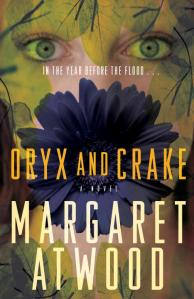“Oryx and Crake” by Margaret Atwood
 I’ve been working on Oryx and Crake
I’ve been working on Oryx and Crake for a while, but finally finished it on the plane back to the United States. I received this book for SantaThing, LibraryThing’s secret santa program (Thanks, Marie!), so I was especially excited to read this book.
I’ve only read one Margaret Atwood book before, The Handmaid’s Tale, which I thought was a great book. (I really need to buy myself a copy at some point.) Even though that was quite a disturbing story, I found Oryx and Crake infinitely more horrifying. Perhaps it is because The Handmaid’s Tale was about a whole system, and told the story of individuals caught in it. Oryx and Crake is about the individuals who created the system, and it is much more horrifying when individuals change the course of the world, and you see an intimate portrait of who they are.
The blurb on the back of the book is pretty vague about what the book is about. I think I got a lot from the experience of letting the book unfold without knowing much about it, so I don’t want to talk too much about what happens. We follow Jimmy, alias Snowman, in his life after the “flood” that wiped out humanity as he watches over the Children of Crake. Much of the book tells the story of Jimmy and how he ended up in this situation, as well as the stories of Oryx and Crake, as seen through Jimmy’s eyes.
The future world is pretty appalling – corporations have secured cities called Compounds where their employees live and work. The rest of the world live in “pleeblands” – dangerous, lawless cities. Corporations dominate the world, using advanced scientific techniques to create animals, pills, self-help tapes – anything that will increase their profit margin and make consumers even more dependent on them.
However, the real focus of the book is on the characters. Jimmy, Oryx and Crake are all characters with serious problems, but it seems like everyone in that world has serious problems by modern day standards. Jimmy makes a very interesting narrator, he seems so hapless (and has terrible survival skills) and stupid, compared to the people he reminisces about. Jimmy the neurotypical, as he is called at one point. Since we only see the other characters through his eyes, we don’t know what actually happened and what is just his interpretation of what happened. He is not without his own insecurities, so it is quite probable that his opinions are coloured by them.
I don’t think I can say much more about the book without ruining certain plot elements, so I won’t say much more. All the characters’ psychologies are scarily real, and this book stuck with me for days afterward. I still keep occasionally thinking about parts of it.
I will read The Year of the Flood, set in the same world and part of a proposed trilogy, but not until a couple of months have passed. It would make me too sad to read it right away.
